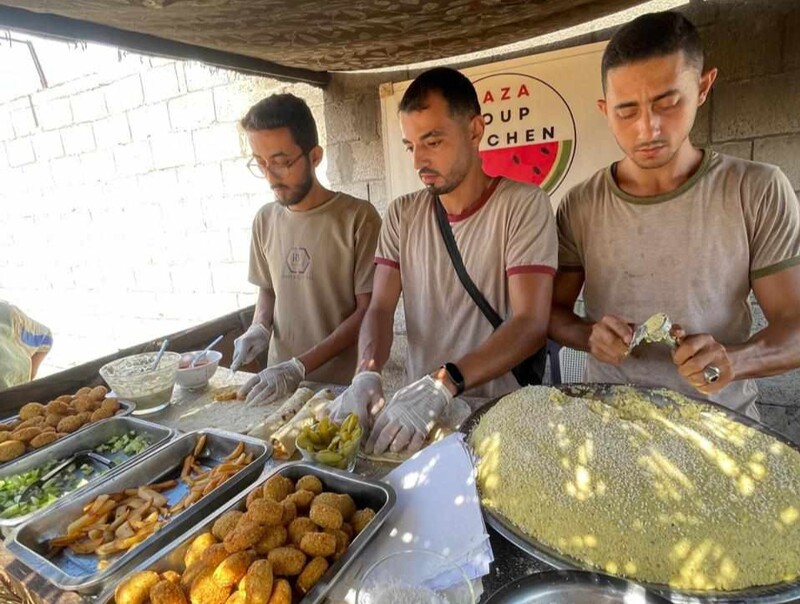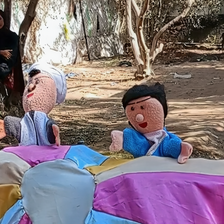The Electronic Intifada 7 November 2024

From left to right: Ibrahim Sharif, Muhammad Sharif and Yazan Younis.
Under the roof of a small kiosk in front of a shelter for the displaced west of the Nuseirat refugee camp in the central Gaza Strip, three young men gathered one morning in July to prepare falafel and sell it to the displaced people around them.
Small falafel kiosks have sprung up all around Gaza over the past year to cater to the hundreds of thousands of displaced people. This one, though, gained fame – not just for its falafel, but for the story that unites the three young men who run it.
“A dentist, a lawyer and an accountant open a falafel stand,” could be the opening of a joke.
But it is a serious story of survival for three young men whose lives have changed beyond recognition under Israel’s year-long genocide in Gaza.
Ibrahim Sharif, 28, is a dentist, who owned his own clinic in Gaza City before last October.
“I had a clinic equipped with the latest medical equipment. It was not only a source of income for me, but also for two other dentists and a secretary who worked with me,” Ibrahim told The Electronic Intifada.
Ibrahim had spent more than $30,000 to open the clinic. He would greet his patients with a wide smile, a smile that became a memory after Israeli airstrikes destroyed the building housing his clinic.
He was also beginning to think of getting married and starting a family. Now, he is left with nothing but rubble and broken dreams.
“The war killed my dreams,” he said, as he labored over the hot falafel pan.
Adapting
Yazan Younis, 28, is my brother-in-law, whose story I’ve partly told before.
Yazan was a well-known lawyer, whose life before the war revolved around defending people’s rights and adjudicating legal cases.
He used to work in his own private office in Gaza City, where he specialized in civil and Sharia law, including marriage and divorce cases. He would spend his days among legal papers and case files, giving advice and arguing for his clients in court.
No longer.
As the bombing escalated, Yazan was forced to flee south with his family, to escape the destruction. His office was completely destroyed in an Israeli airstrike.
Yazan tried to work after his displacement. But the situation in the southern Gaza Strip was not favorable, and the judicial system across Gaza has been completely disrupted.
“There is no longer a judiciary,” Yazan told The Electronic Intifada. “The legal profession has stopped.”
Yazan, who supports a family of four, suddenly found himself without an income.
“I can’t even afford to buy bread for my children. I’m no longer the lawyer I used to be,” he said.
Muhammad Sharif, 34, Ibrahim’s brother, used to work as an accountant for Metro Mall, the oldest and largest mall in the Gaza Strip.
The mall was an integral part of Gaza City life, located along “Unknown Soldier” square, one of the city’s most prominent commercial hubs.
But the genocide left nothing intact. The mall has been completely destroyed, and the Israeli army has leveled the entire square with all its shops.
Challenges:
The three men’s falafel stand was a response to need, an attempt by three highly educated men to adapt to the circumstances of a genocide that has radically changed the course of their lives.
Only Ibrahim has no children to feed. Muhammad supports a family of 5, in addition to his elderly father and mother, who do not have any source of income.
The three divide their tasks up to make work proceed smoothly.
Ibrahim is in charge of securing firewood for cooking. Yazan prepares the falafel and cooks, while Muhammad puts together the sandwiches.
Finding firewood is often the biggest challenge the three men face. Israel has blocked the entrance of cooking gas to northern Gaza for over a year. In southern Gaza only small amounts are allowed in, families receiving just seven liters of cooking gas every 45 days – not enough to meet a family’s needs, let alone the demands of a food stand.
As a result, Gazans have resorted to chopping down trees, breaking up furniture or even cutting down electricity poles to secure firewood for cooking – contributing to widespread damage to the environment.
Aside from firewood, the lack of electricity has meant that the three men have to combine the falafel mixture of chickpeas and other legumes by hand, a strenuous job normally done by machine.
Nevertheless, the falafel stand has proven a good source of income.
“We open the kiosk and prepare falafel twice a day, once in the morning and once in the evening,” said Ibrahim.
With the ingredients relatively cheap, the friends can sell ten falafel for $1, bringing in plenty of customers in the area.
“I often come across customers who used to frequent the mall where I worked,” Muhammad said. “They used to pay me for accounts. Today, they buy falafel from me.”
But the three friends keep a particularly wary eye on the scarcity of firewood and wood, which are harder to find every day.
“When the wood runs out, we will return to being unemployed. Then we will not be able to provide food for our children,” said Muhammad.
Rasha Abou Jalal is a writer and journalist from Gaza. On Twitter/X: @rashaaboujalal1





